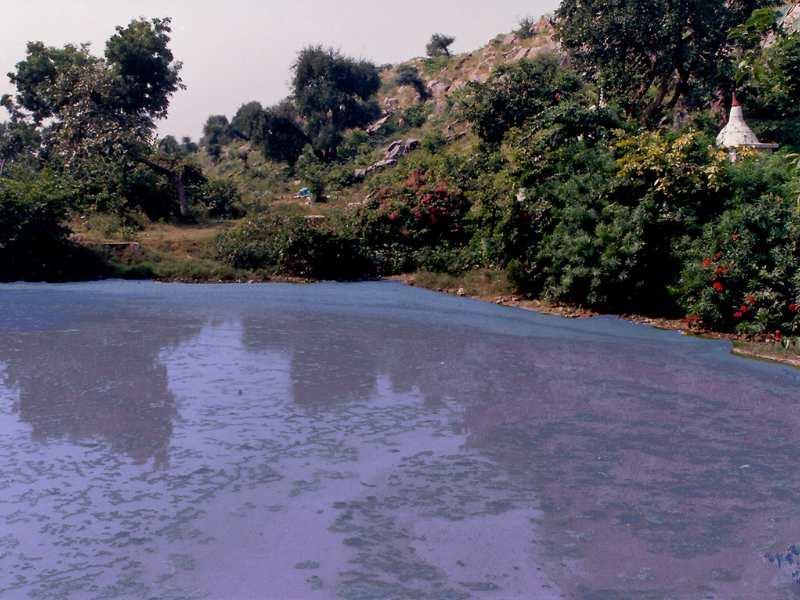
Daan Nivartan Van
Shri Vraj Mandal Parikarma
Garga Samhita
Text 15
tatraikadä vai dadhi-vikrayärthaà
vinirgato gopa-vadhü-samühaù
çrutvä kvaëan-nüpura-çabdam äräd
rorodha tan-märgam anaìga-mohé
tatra—there; ekadä—once; vai—indeed; dadhi-vikrayärtham—to sell yogurt; vinirgataù—gone; gopa-vadhü-samühaù—the gopés; çrutvä—hearing; kvaëan-nüpura-çabdam—tinkling anklets; ärät—nearby; rorodha—stopped; tan-märgam—their pathway; anaìga-mohé—more charming than Kämadeva.
One day, hearing tinkling anklets as the gopés walked nearby on their way to sell yogurt, Kåñëa, who is more charming than Kämadeva, stopped them on the path.
Text 16
vaàçé-dharo vetra-vareëa gopaiù
puraç ca täsäà vinidhäya pädam
mahyaà karädäna-dhanäya dänaà
dehéti gopér nijagäda märge
vaàçé-dharaù—holding a flute; vetra-vareëa—with a stick; gopaiù—with the gopas; puraù—ahead; ca—and; tasam—of them; vinidhäya—placing; pädam—foor; mahyam—to me; karadana-dhanäya dänam—a toll; dehi—give; iti—thus; gopéù—to the gopés; nijagäda—said; märge—on the pathway.
Holding a flute and a stick, and going ahead of the gopas, Kåñëa confronted the gopés on the path and demanded, “You must pay a toll to Me.”
Text 17
çré-gopya ücuù
vakras tvam eväsi samasthitaù pathi
gopärbhakair gorasa-lampaöo bhåçäà
mäträ cä piträ saha kärayämo
baläd bhavantaà kila kaàsa-bandhane
çré-gopya ücuù—the gopés said; vakraù—crooked; tvam—You; eva—indeed; asi—are; samasthitaù—standing; pathi—on the path; gopärbhakaiù—with the gopa boys; gorasa-lampaöaù—greedy for yogurt; bhåçäm—greatly; mäträ—by Your mother; cä—and; piträ—father; saha—with; kärayämaù—we will do; balät—forcibly; bhavantam—You; kila—indeed; kaàsa-bandhane—in the bonds of Kaàsa.
The gopés said: You are crooked. You and Your gopa boys now block our path. You are greedy after yogurt. We will see to it that You, Your mother, and Your father are all locked up in Kaàsa’s prison.
Text 18
çré-bhagavän uväca
kaàsaà haniñyämi mahogra-daëòaà
sa-bändhavaà me çapatho gaväà ca
evaà kariñyämi yadoù pure balän
neñye sadähaà giriräja-bhümeù
çré-bhagavän uväca—the Supreme Personality of Godhead said; kaàsam—Kaàsa; haniñyämi—I will kill; mahogra-daëòam—ferocious; sa-bändhavam—with his friends; me—of Me; çapathaù—a vow; gaväm—of the cows; ca—and; evam—thus; kariñyämi—I will do; yadoù—of the Yadus; pure—in the city; balän—forcibly; neñye—I will bring; sadä—always; aham—I; giriräja-bhümeù—on Govardhana Hill.
The Supreme Personality of Godhead said: I will kill ferocious Kaàsa and all his friends. That is My solemn vow. Every day I will take the cows from Mathurä to Govardhana Hill.
Text 19
çré-närada uväca
ity uktvä dadhi-päträëi
bälair nétvä påthak påthak
bhü-påñöhe pothayäm äsa
sänandaà nanda-nandanaù
çré-närada uväca—Çré Närada said; ity—thus; uktvä—speaking; dadhi-päträëi—the pots of yogurt; bälaiù—with the boys; nétvä—taking; påthak påthak—sepcific; bhü-påñöhe—on tyhe ground; pothayäm äsa—placed; sänandam—with joy; nanda-nandanaù—Nanda’s son.
Çré Närada said: After speaking these words, Kåñëa and the boys took the jars of yogurt and joyfully placed them on the ground.
Texts 20 and 21
aho eña paraà dhåñöo
nirbhayo nanda-nandanaù
niraìkuço bhäñaëéyo
vane véraù pure ‘balaù
bruvämahe yaçodäyai
nandäya ca kilädya vai
evaà vadantyas tä gopyaù
sa-smitäù prayayur gåhän
ahaù—oh; eña—He; param—very; dhåñöaù—arrogant; nirbhayaù—fearless; nanda-nandanaù—Nanda’s son; niraìkusaù—merciless; bhäñaëéyaù—talkative; vane—in the forest; véraù—a hero; pure—in the city; abalaù—a weakling; bruvämahe—we will tell; yaçodäyai—Yaçodä; nandäya—Nanda; ca—and; kila—certainly; adya—now; vai—indeed; evam—thus; vadantyaù—speaking; täù—the; gopyaù—gopés; sa-smitäù—smiling; prayayuù—went; gåhän—to their homes.
Saying “Kåñëa is a bold, fearless, ferocious, and talkative hero here in the secluded forest, but in the city, surrounded by many men, He is only a weakling. We will certainly tell Nanda and Yaçodä what He has done,” the smiling gopés went to their homes.
Text 22
népa-päläça-paträëäà
kåtvä droëäni mädhavaù
jaghäsa bälakaiù särdhaà
picchaläni dadhéni ca
népa-päläça-paträëäm—nipa and palasa leaves; kåtvä—making; droëäni—cups; mädhavaù—Kåñëa; jaghäsa—ate; bälakaiù—the boys; särdham—with; picchaläni—picchala; dadhéni—yogurt; ca—and.
Then, making cups of népa and päläça leaves, Kåñëa and the boys ate the yogurt and picchala.
Text 23
droëäkäräëi paträëi
babhüvuù çäkhinäà tadä
tat-kñetraà ca mahä-puëyaà
droëaà näma nåpeçvara
droëäkäräëi—cups; paträëi—leaves; babhüvuù—were; çäkhinäm—of the trees; tadä—then; tat-kñetram—that place; ca—and; mahä-puëyam—very sacred; droëam—Droëa; näma—named; nåpeçvara—O king of kings.
O king of kings, that very sacred place, where the trees’ leaves became cups, is called Droëa-tértha.
Text 24
dadhi-dänaà tatra kåtvä
pétvä patra-dhåtaà dadhi
namaskuryän naras tasya
golokän na cyutir bhavet
dadhi—of yogurt; dänam—the giving; tatra—there; kåtvä—doing; pétvä—drinking; patra-dhåtam—held in a leaf-cup; dadhi—yogurt; namaskuryät-bowing down; naraù—a person; tasya—of him; golokät—from Goloka; na—not; cyutiù—falling; bhavet—will be
A person who at this place gives yogurt in charity, drinks yogurt from a leaf-cup, and then bows down to offer his respectful obeisances, never falls from Goloka.
Leave a comment